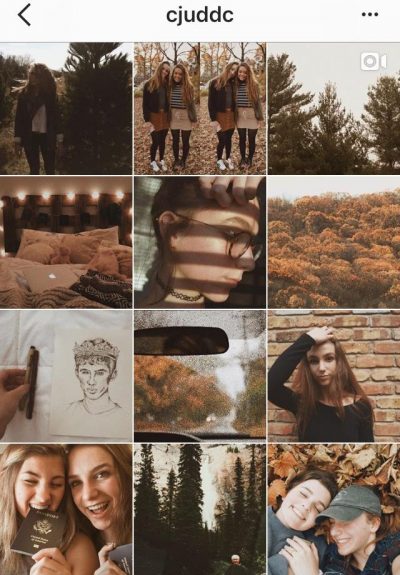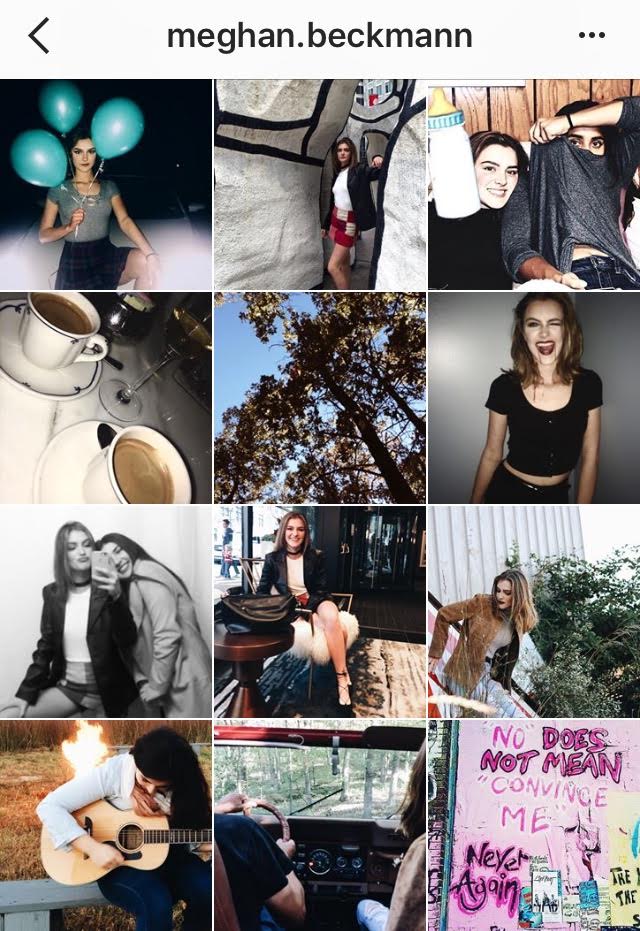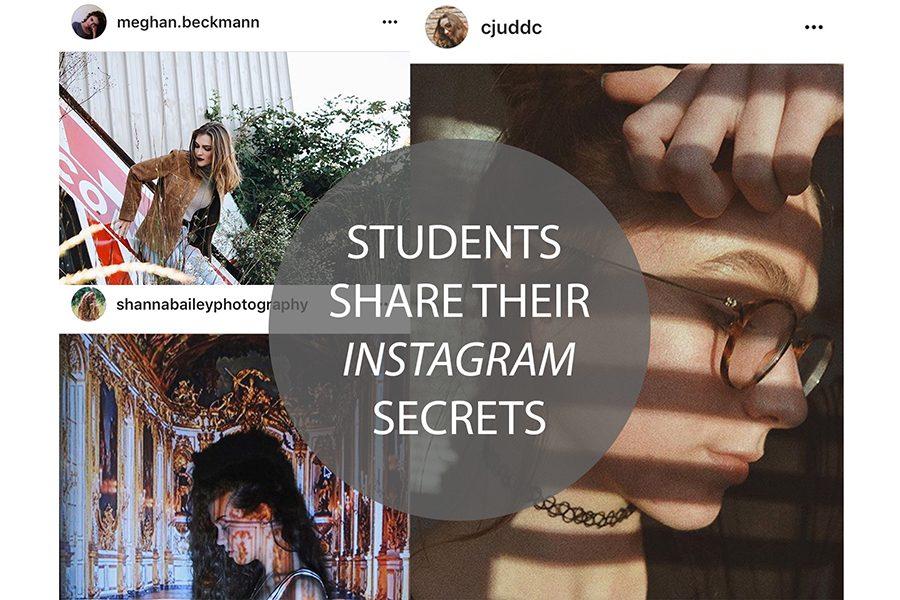Shanna Bailey, Meghan Beckmann, Caroline Judd
Students showcase their photography on Instagram’s virtual platform.
As the world enters a new age of social media, it allows all individuals to create innovative photos and videos, while also branding themselves with a digital persona. These students have found a passion in Instagram, and strive to achieve quality works though shooting, editing and portraying words of activism through their posts.
December 16, 2016
Pathfinder: It can take a lot of time and effort to find your persona on social media. How did you discover your own aesthetic in your photos, and where did that inspiration come from?
Caroline Judd: “I enjoy photography and so do my sisters, so it’s nice that we can all do it together. I love being creative and with Instagram I can share it with other people. I get my inspiration from other people, other photographers. Zoe Laz and Jay Alvarrez I like people who make cool videos and things like that.”
Shanna Bailey: “My inspiration comes from everywhere. I’m constantly taking pictures I’m constantly looking through a viewfinder. I see a lot of the stuff through a lens, and I think a lot of that is reflected in the pictures that I post, and how my Instagram looks. There’s not a specific place I get my inspiration from, it’s just whatever comes up and whatever I like.”
Rachel Neupert: “Well, I like to take a lot of pictures, and each photo I take is always associated with a certain memory that I really enjoyed. In that way, it describes me. My inspiration also comes from everything around me, I find it a lot in ordinary life because I don’t go a lot of places, so you kind of have to find beauty and inspiration in your own little world.”

Pathfinder: Instagram and other social medias have presented opportunities for individuals to pursue careers regarding the communications and multimedia industry. Many Instagram aficionados are either pursuing one of these positions, as well as grabbing brand deals; Instagram has become a great platform for a career. Would you want to pursue a job in the industry?
Judd: “I think that would be really cool. I know that there is a lot of opportunities online and there’s YouTube also a lot of brands I like, such as Urban Outfitters, have sponsor opportunities online and that people do that for a job and they can travel and take pictures for them and that would be awesome. That would be the dream if you could just travel and take pictures for a company, it would tie it altogether.”
Neupert: “I do enjoy Instagram and the artistic components with it, yet I am not sure if I would want to pursue a job in the industry. Instagram is just a hobby for me, and I am not sure if I would have the same joy from it if I had it as my occupation. But, social media has gotten so big in these past few years, and it has established a lot more opportunities for artistic people to flourish.”
Pathfinder: Have you ever felt pressure to changing yourself due to the influence of others on Instagram, or have you changed in order to please those online?
Judd: I use too. When I was in middle school I used to feel like I needed to dress how everyone else dressed. I’ve always liked feeling, not different but I didn’t like wearing what everyone else was wearing all the time and in middle school, I thought people would judge me if I didn’t. You should really do whatever you want to do. My Instagram, is a way to show people what I like to do. When it comes to being in real life, I do my hair if it makes me happy. I don’t feel pressure because whatever you want to do, you just have to do it.”
Meghan Beckmann: “I think everyone can agree that they feel pressured on social media. There are opinions thrown at you from everywhere, and even though they evolve and change as trends pass, they always will be subconsciously influencing you.”
Neupert: “I don’t follow a lot of accounts that are pictures of people very much, so I don’t feel pressured to look a certain way, but I do feel pressure to act a certain way. There is a lot of pressure to uphold the same values as your peers on social media, and because of that I am more inclined to follow those ideas projected rather than make your opinions and claims. I am constantly surrounded by so many other voices, it can be overwhelming.”

Pathfinder: “How has Instagram influenced you in a creative aspect? How has the social media changed your perception of the world around you?”
Bailey: “A lot of people come up and talk to me about my Instagram. I always aspire to get better and post better pictures because I know there are people watching and looking at it and looking up to it, it’s like the pressure thing, but good pressure.”
Beckmann: “I definitely take more responsibility for the quality of my photos. I put a lot of work into everyone’s photos, even if it just some random person on the street who asks if I can take their picture. I make a conscious effort to make their photo look good, I even take a couple candids because you never know when someone might want one. I think it has definitely helped me broaden how I take photos and the effort I put into it.”
Neupert: “Instagram has allowed me to look a lot more at details and lighting in each setting. For instance, just last week I was in my room and there was a sunset. My dad was trying to deliver clothes to me while I was sprawled out on the ground trying to get a good angle at the window. He had no idea what I was doing. What I am trying to say is now I look at the world through a different eye.”
Pathfinder: Have you ever felt pressured to censor yourself. How does the idea of censorship influence you as a creator?
Beckmann: “I censored one of my captions the other day, I have had to censor myself occasionally. There is definitely pictures I want to post, but it would be considered “wrong” if I did which is really disappointing.”
Neupert: “Sometimes I feel censored, on social media you can’t just have a stream of unconscious writing, or talk like you are talking to a friend. Because you have a follower count, and many different kinds of people are looking at the content you put out. Most of the time they are people that you know, yet don’t know very well and I don’t want to talk to them like I would a close friend of family member.”

Pathfinder: The process to prepare an Instagram photo or video can be quite extensive, and filled with multiple apps and filters. What is the typical routine you go through from shooting the photo, editing it, and posting?
Judd: “I take pictures and videos on my Nikon, load them onto my computer, send them to myself. I always use VSCO [for filters] and it kind of depends on the seasons because of the colors and everything. I turn the grain and warmth up, because I like warm pictures. I try to make sure the pictures of the filter go with the filter in the photo.
Bailey: “Well when I take photos, I take 100s of them, it’s never just one. But there is always one photo I like the best; my friends are so funny when I do it because I always get so excited and they’re like ‘that’s the one that’s going to go on Instagram.’ I pick my favorite one, I really don’t edit my photos that much, I like to keep it raw and real I might do some saturation or contrast but it’s never a straight effect. I hope you can’t tell, I never try to make it obvious. I pick my favorite, I make it look a little better and than I post it. I use VSCO, I love VSCO.”
Neupert: “I don’t edit a lot of my photos, but I do take a photo a couple weeks before I post it. My Instagram is not really a spur of the moment kind of thing, or I don’t really look for photo opportunities around me. Very often I will take a photo, typically it’s a photo of the sky, and it sits in my camera roll for a long time. And usually once or twice a month I will post what ever photo I think is best. I don’t really have a schedule though, I just post when I want to. I typically don’t edit them because I love the look of a raw photo, it it always so nice as it is without all the fancy filters.”
Pathfinder: Do you feel that the topic of trends and fads of the moment has been amplified with the aid of social media? Do you feel that it is hard to stay interesting when you are in such a public eye?
Judd: “The trends should inspire you instead of making you feel like you have to follow them. You see a lot of ‘new things’ on social media, they could be inspiring but it could be really stressful to follow all of them. If you like it than you can [follow the trends] but if you don’t don’t.”
Bailey: “I’ve never really and that problem I think that if you’re into it enough your mind is constantly thinking of new things. I know I’m constantly looking for inspiration and constantly finding new ideas, and constantly asking my friends if they’ll do it with me. I’ve never been worried about losing the spark or anything. I guess it could happen but, I hope not.”
Beckmann: “I always feel stressed to stay relevant, there are always times where I am feeling my Instagram and others where I actually cry over my Instagram feed! Sometimes I just want to delete everything, and start over again, but I never do because there are so many memories captured in my feed. With social media, I am able to keep those memories forever. I am so terrified of the possibility of getting kicked out of Instagram or my account getting deleted.”
Neupert: “Instagram definitely goes through certain themes in what is cool to post, and what is not. But, it’s hard to stay relevant sometimes. The bottom line is you should post what you want and eventually that will define your Instagram more than everyones elses.”

Pathfinder: Last year, CNN released an article documenting how Instagram has changed the world due to its ability to localise travel, arts, activism, among other possible outlets. Would you give Instagram this accolade, and why has it reached these capabilities?
Judd: “I think it has. It’s definitely made an impact because it gives people a voice, especially people who want to share their opinion or want to express themself, because they’re able to do that [with the help of social media].
Neupert: “I was just thinking the other night how social media has changed the world. I was reading something in my history textbook how people get more tolerant of other beliefs and ideas when they are in an urbanized setting, just because exposure to all sorts of other people’s beliefs forces tolerance. I was thinking how social media creates an urban environment because you are a click away from other people’s viewpoints and perspectives and that creates a setting where we become more tolerant, and learn more about others faster because we are all so close together in social media.”
Pathfinder: Many successful Instagram personalities and celebrities are releasing statements saying Instagram is influencing their life to an unhealthy extent. For instance, social media celebrity, Kendall Jenner who has the most liked post in Instagram history and currently has 68.6 millions followers confessed to talk show host Ellen Degeneres after deleting her Instagram. Jenner said, ‘I am always on it, it’s the first thing I looked at when I woke up and the last thing I saw when I went to bed. It was exhausting and I needed a break.’ Do you connect to this perspective, and is a social media detox needed occasionally?
Judd: “I don’t think it’s toxic, because it’s something I enjoy doing, the whole process of capturing the moment. I think people can get their values mixed up when it comes to Instagram. I don’t think it’s about having a perfect this or a perfect that. I’ll look at my pictures and they’ll make me smile because they make me happy, you think of the moment you were taking the picture. I think that’s more what it’s about, sharing things that make you happy, versus looking perfect all the time. I think when people need to detox is because they feel like they’ve set standards so high. You just have to have your values right when you’re sharing.”
Bailey: “I have done the detox for a weekend, or three or four days before, honestly I felt a lot better after it. I definitely think it does take a toll on you. When you’re constantly looking at other people’s feeds and constantly looking at people you want to be, there’s negative stuff and positive stuff and your mind just becomes overridden with it all. I think if you take a break from it it really helps. For me there isn’t much pressure but I know it’s easy for other people to feel pressure from it.”
Beckmann: “I have noticed how much time I spend on Instagram, I wish I could detox, but Instagram is such an important part of my life. I would be scared to delete it, because I have no idea what I would spend my time doing. In my free time, I go through my photos and edit them, it’s my output”
Neupert: “If you focus on it to much it can kind of control your life, which is why I try not to post too much. On social media you need that constant validation from people from likes and comments, and if you are too absorbed into the world Instagram creates, it becomes very nerve-wracking and unenjoyable.”

